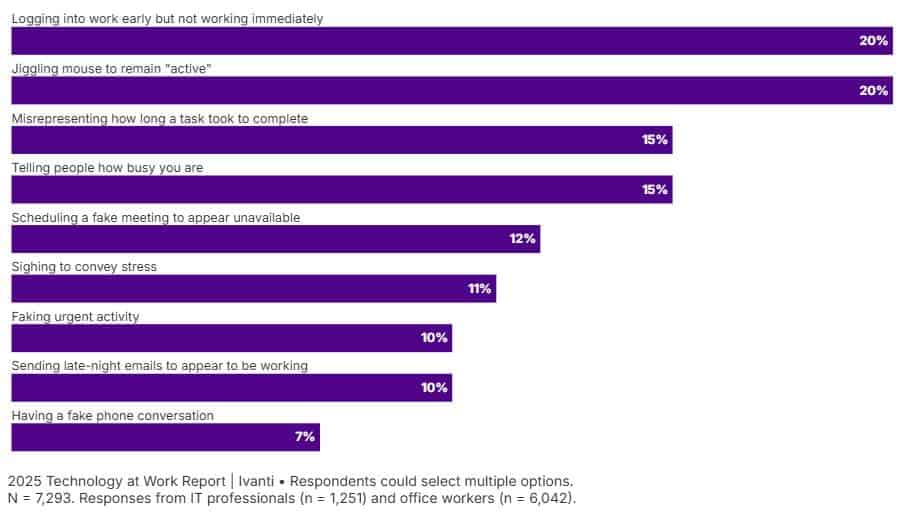The 2025 Technology at Work Report: Reshaping Flexible Work revealing that nearly a third of employees using AI tools keep their productivity gains secret from their employers. This research, which surveyed over 6,000 office workers and 1,200 IT and cybersecurity professionals, explores the complexities of modern work amid economic uncertainty, return-to-office mandates, and evolving workplace expectations.
Figure 1: Workers admit to engaging in behaviors to "look busy" during work hours

Source: Ivanti, 2025
The report highlights that 30% of employees using generative AI tools express concerns over job security, while 27% experience AI-fuelled imposter syndrome, fearing that their abilities may be questioned.
“Employees continue to seek greater autonomy over their work lives and desire AI solutions to enhance their productivity,” stated Brooke Johnson, Ivanti's chief legal counsel and SVP of HR and Security. She emphasised the need for organisations to adopt sustainable AI governance models that promote transparency and address the emotional challenges tied to AI usage.
Despite these concerns, the adoption of generative AI in the workplace has surged, with 42% of employees reporting its use in 2025, up from 26% in 2024. However, many employees also experience resenteeism—disliking their job yet remaining in it—reported by 48% of workers.
Presenteeism, where employees show up merely to be seen, affects 39%. These behaviours highlight the necessity for employers to engage their workforce meaningfully and acknowledge their contributions, irrespective of their work location.
For IT professionals, these issues can significantly impact organisational productivity and security. While 83% view flexible work as essential, only 25% describe their current roles as highly flexible, and 64% feel pressure to return to the office. This situation is particularly concerning given the ongoing competition for skilled IT talent.
Ivanti's findings underscore several critical points:
- Secretive AI use: 32% of employees using generative AI tools keep it confidential. Many appreciate the “secret advantage” it provides, while concerns about job security and competence contribute to this secrecy. However, the use of unauthorised AI tools poses cybersecurity risks.
- Remote access after hours: Despite return-to-office mandates, 85% of employees log in remotely after hours to check emails or complete tasks, indicating a need for robust security measures across all forms of work.
- Job flexibility demand: Younger workers, particularly Gen Z (54%) and millennials (53%), are more inclined to switch jobs for greater flexibility. Nearly half of workers feel that inflexible scheduling shows a lack of value from their employer.
- Tech complexity vs. AI benefits: As companies prepare to invest trillions in technology, 46% of IT professionals report increased ticket volumes due to new software, complicating innovation efforts. Until organisations streamline their tech stacks and break down data silos, the full benefits of AI may remain untapped.
In summary, Ivanti’s research highlights a critical crossroads for organisations looking to adapt to evolving workplace dynamics and maximise the potential of AI technologies while addressing employee concerns and enhancing operational efficiency.



